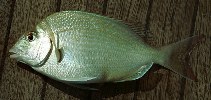Stenotomus chrysops (Linnaeus, 1766)
Scup
Add your observation in Fish Watcher
| Native range | All suitable habitat | Point map | Year 2050 |

|
| This map was computer-generated and has not yet been reviewed. |
| Stenotomus chrysops AquaMaps Data sources: GBIF OBIS |
Upload your photos and videos
Pictures | Google imageStenotomus chrysops
Picture by JJPhoto
Pictures | Google imageStenotomus chrysops
Picture by JJPhoto
Common names from other countries
Classification / Names Common names | Synonyms | Catalog of Fishes(genus, species) | ITIS | CoL | WoRMS | Cloffa
Teleostei (teleosts) > Eupercaria/misc (Various families in series Eupercaria) > Sparidae (Porgies)
Etymology: Stenotomus: Greek, stenos = narrow + Greek, stoma = mouth (Ref. 45335).
More on author: Linnaeus.
Etymology: Stenotomus: Greek, stenos = narrow + Greek, stoma = mouth (Ref. 45335).
More on author: Linnaeus.
Environment: milieu / climate zone / depth range / distribution range Ecology
Marine; demersal; oceanodromous (Ref. 51243); depth range 15 - ? m (Ref. 4926). Subtropical; 46°N - 25°N
Distribution Countries | FAO areas | Ecosystems | Occurrences | Point map | Introductions | Faunafri
Western Atlantic: Nova Scotia in Canada to Florida in USA; rare south of North Carolina, USA.
Length at first maturity / Size / Weight / Age
Maturity: Lm 15.5 range ? - ? cm
Max length : 46.0 cm TL male/unsexed; (Ref. 7251); common length : 25.0 cm TL male/unsexed; (Ref. 9988); max. published weight: 2.1 kg (Ref. 40637)
Max length : 46.0 cm TL male/unsexed; (Ref. 7251); common length : 25.0 cm TL male/unsexed; (Ref. 9988); max. published weight: 2.1 kg (Ref. 40637)
Occurs usually in schools inshore in summer and offshore in winter. Feeds on amphipods, worms, sand dollars and young squid (Ref. 4926). Utilized fresh, smoked and frozen; eaten pan-fried, broiled and baked (Ref. 9988). Exported to Japan (Ref. 9988)
Life cycle and mating behavior Maturity | Reproduction | Spawning | Eggs | Fecundity | Larvae
Main reference
Upload your references | References | Coordinator | Collaborators
Robins, C.R. and G.C. Ray, 1986. A field guide to Atlantic coast fishes of North America. Houghton Mifflin Company, Boston, U.S.A. 354 p. (Ref. 7251)
IUCN Red List Status (Ref. 130435: Version 2024-1)
Near Threatened (NT) ; Date assessed: 26 May 2011
Human uses
Fisheries: commercial; gamefish: yes; aquarium: public aquariums
FAO(Fisheries: production; publication : search) | FishSource | Sea Around Us
More information
Population dynamics
Growth parameters
Max. ages / sizes
Length-weight rel.
Length-length rel.
Length-frequencies
Mass conversion
Recruitment
Abundance
Growth parameters
Max. ages / sizes
Length-weight rel.
Length-length rel.
Length-frequencies
Mass conversion
Recruitment
Abundance
Physiology
Body composition
Nutrients
Oxygen consumption
Swimming type
Swimming speed
Visual pigments
Fish sound
Diseases & Parasites
Toxicity (LC50s)
Body composition
Nutrients
Oxygen consumption
Swimming type
Swimming speed
Visual pigments
Fish sound
Diseases & Parasites
Toxicity (LC50s)
Tools
E-book | Field guide | Identification keys | Length-frequency wizard | Life-history tool | Point map | Classification Tree
| Catch-MSY |
Special reports
Download XML
Internet sources
Alien/Invasive Species database | Aquatic Commons | BHL | Cloffa | Websites from users | Check FishWatcher | CISTI | Catalog of Fishes(genus, species) | DiscoverLife | ECOTOX | Faunafri | Fishtrace | GenBank(genome, nucleotide) | GloBI | GOBASE | | Google Books | Google Scholar | Google | IGFA World Record | MitoFish | Otolith Atlas of Taiwan Fishes | Public aquariums | PubMed | Reef Life Survey | Scirus | SeaLifeBase | Tree of Life | Wikipedia(Go, Search) | World Records Freshwater Fishing | Zoological Record
Estimates based on models
Preferred temperature (Ref. 115969): 9.4 - 24.6, mean 23.5 (based on 106 cells).
Phylogenetic diversity index (Ref. 82804): PD50 = 0.7500 [Uniqueness, from 0.5 = low to 2.0 = high].
Bayesian length-weight: a=0.01738 (0.01058 - 0.02855), b=3.02 (2.88 - 3.16), in cm Total Length, based on LWR estimates for this species & (Sub)family-body (Ref. 93245).
Trophic level (Ref. 69278): 3.8 ±0.1 se; based on diet studies.
Resilience (Ref. 120179): Medium, minimum population doubling time 1.4 - 4.4 years (K=0.17-0.23; tmax=19).
Fishing Vulnerability (Ref. 59153): Moderate to high vulnerability (51 of 100).
Climate Vulnerability (Ref. 125649): Moderate vulnerability (40 of 100).




